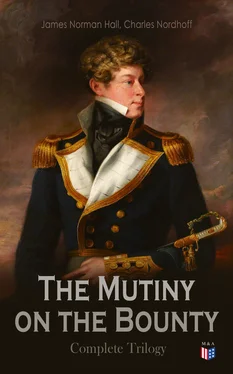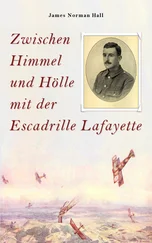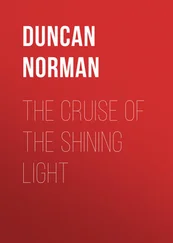1 ...6 7 8 10 11 12 ...48 That night the wind increased to a strong gale, with a heavy sea, but on the following day the weather moderated, permitting us to keep our Christmas cheerfully. Extra grog was served out, and the mess cooks were to be heard whistling as they seeded the raisins for duff, not, as a landsman might suppose, from the prospect of good cheer, but in order to prove to their messmates that the raisins were not going into their mouths.
I was still making the acquaintance of my shipmates at this time. The men of the Bounty had been attracted by the prospect of a voyage to the South Sea, or selected for their stations by the master or Bligh himself. Our fourteen able-bodied seamen were true salts, not the scum of the taverns and jails impressed to man so many of His Majesty’s ships; the officers were nearly all men of experience and tried character, and even our botanist, Mr. Nelson, had been recommended by Sir Joseph Banks because of his former voyage to Tahiti under Captain Cook. Mr. Bligh might have had a hundred midshipmen had he obliged all those who applied for a place in the Bounty’s berth; as it was, there were six of us, though the ship’s establishment provided for only two. Stewart and Young were seamen and pleasant fellows enough; Hallet was a sickly-looking boy of fifteen with a shifty eye and a weak, peevish mouth; Tinkler, Mr. Fryer’s brother-in-law, was a year younger, though he had been to sea before—a monkey of a lad, whose continual scrapes kept him at the masthead half the time. Hayward, the handsome, sulky boy I had met when I first set foot in the berth, was only sixteen, but big and strong for his age. He was something of a bully and aspired to be cock of the berth, since he had been two years at sea aboard a seventy-four.
I shared with Hayward, Stewart, and Young a berth on the lower deck. In this small space the four of us swung our hammocks at night and had our mess, using a chest for a table and other chests for seats. On consideration of a liberal share of our grog, received each Saturday night, Alexander Smith, able-bodied, acted as our hammock man, and for a lesser sum of the same ship’s currency, Thomas Ellison, the youngest of the seamen, filled the office of mess boy. Mr. Christian was caterer to the midshipmen’s mess; like the others, I had paid him five pounds on joining the ship, and he had laid out the money in a supply of potatoes, onions, Dutch cheeses (for making that midshipman’s dish called “crab”), tea, coffee, and sugar, and other small luxuries. These private stores enabled us to live well for several weeks, though a more villainous cook than young Tom Ellison would be impossible to find. As for drink, the ship’s allowance was so liberal that Christian made no special provision for us. For a month or more every man aboard received a gallon of beer each day, and when that was gone, a pint of fiery white mistela wine from Spain—the wine our seamen love and call affectionately “Miss Taylor.” And when the last of the wine was gone we fell back on an ample supply of the sailor’s sheet anchor—grog. We had a wondrous fifer on board—a half-blind Irishman named Michael Byrne. He had managed to conceal his blindness till the Bounty was at sea, when it became apparent, much to Mr. Bligh’s annoyance. But when he struck up “Nancy Dawson” on the first day he piped the men to grog, his blindness was forgotten. He could put more trills and runs into that lively old tune than any man of us had heard before—a cheeriness in keeping with this happiest hour of the seaman’s day.
We lost a good part of our beer in a strong easterly gale that overtook the Bounty the day after Christmas. Several casks went adrift from their lashings and were washed overboard when a great sea broke over the ship; the same wave stove in all three of our boats and nearly carried them away. I was off watch at the time, and below, diverting myself in the surgeon’s cabin on the orlop, aft. It was a close, stinking little den, below the water line—reeking of the bilges and lit by a candle that burned blue for lack of air. But that mattered nothing to Old Bacchus. Our sawbones’s name was Thomas Huggan and it was so inscribed on the ship’s articles, but he was known as Old Bacchus to all our company. His normal state was what sailors call “in the wind” or “shaking a cloth,” and the signal that he had passed his normal state earned him the name by which all hands on the Bounty knew him. When he had indiscreetly added a glass of brandy or a tot of grog to the carefully measured supply of spirits demanded at close intervals by a stomach which must have been copper-sheathed, it was his custom to rise, balancing himself on his starboard leg, place a hand between the third and fourth buttons of his waistcoat, and recite with comic gravity a verse which begins:—
Bacchus must now his power resign.
With his wooden leg, his fiery face, snow-white hair, and rakish blue eyes, Old Bacchus seemed the veritable archetype of naval surgeons. He had been afloat so long that he could scarcely recollect the days when he had lived ashore, and viewed with apprehension the prospect of retirement. He preferred salt beef to the finest steak or chop to be obtained ashore, and confided to me one day that it was almost impossible for him to sleep in a bed. A cannon ball had carried away his larboard leg when his ship was exchanging broadsides, yardarm to yardarm, with the Ranger, and he had been made prisoner by John Paul Jones.
The cronies of Old Bacchus were Mr. Nelson, the botanist, and Peckover, the Bounty’s gunner. The duties of a gunner, onerous enough on board a man-of-war, were of the very lightest on our ship, and Peckover—a jovial fellow who loved a song and a glass dearly—had some leisure for conviviality. Mr. Nelson was a quiet, elderly man with iron-grey hair. Though devoted to the study of plants, he seemed to derive great pleasure from the surgeon’s company, and could spin a yarn with the best when in the mood. The great event in his life had been his voyage to the South Sea with Captain Cook, whose memory he revered.
Mr. Nelson’s cabin was forward of the surgeon’s, separated from it by the cabin of Samuel, the captain’s clerk, and he was to be found more often in the surgeon’s cabin than in his own. All of the cabins were provided with standing bed places, built in by the carpenters at Deptford, but Bacchus preferred to sling a hammock at night, and used his bed as a settee and the capacious locker under it as a private spirit room. The cabin was scarcely more than six feet by seven; the bed occupied nearly half of this space, and opposite, under the hammock battens, were three small casks of wine, as yet unbroached. On one of them a candle guttered and burned blue.
Another cask served as a seat for me, and Bacchus and Nelson sat side by side on the bed. Each man held a pewter pint of flip—beer strongly laced with rum. The ship was on the larboard tack and making heavy weather of it, so that at times my cask threatened to slide from under me, but the two men on the settee seemed to give the weather no thought.
“A first-rate man, Purcell!” remarked the surgeon, glancing down admiringly at his new wooden leg; “a better ship’s carpenter never swung an adze! My other leg was most damnably uncomfortable, but this one’s like my own flesh and bone! Mr. Purcell’s health!” He took a long pull at the flip and smacked his lips. “You’re a lucky man, Nelson! Should anything happen to your underpinning, you’ve me to saw off the old leg and Purcell to make you a better one!”
Nelson smiled. “Very kind, I’m sure,” he said; “but I hope I shall not have to trouble you.”
“I hope not, my dear fellow—I hope not! But never dread an amputation. With a pint of rum, a well-stropped razor, and a crosscut saw, I’d have your leg off before you knew it. Paul Jones’s American surgeon did the trick for me.
Читать дальше











